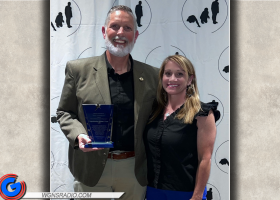The court date for a woman accused of burning a little girl is nearing. The 23-year old Murfreesboro resident was arrested on aggravated child abuse charges this past July.
Looking back, MPD Detective Tommy Roberts asked Amber Waight to visit the Police Department and according to the arrest report, she agreed. Once there, Detective Roberts interviewed Waight about burning a four year old child with a cigarette.
Waight confessed to burning the little girl "multiple times with a cigarette." After the interview was completed, the woman was arrested and charged with a Tennessee Code that is sometimes referred to as "Haley's Law." The law makes it a Class A Felony to abuse a child who is under the age of 9 in a way that leads to bodily injury.
Haley's Law was formed in remembrance of a case in East Tennessee from 2004. "Baby Haley" was badly abused with burns all over her body when she was found. Her eyes were swollen shut and her ears bleeding. The case of Haley Spice had a remarkable outcome though, she has made a tremendous recovery over the years. Haley was abused by her father and step mother.
As for the suspect in Murfreesboro, she was booked under a $5,000 bond after her confession, according to Murfreesboro Police. She is scheduled to appear in court on August 21, 2014. At this time she remains behind bars at the Rutherford County Sheriff's Office.
Source:
MPD Arrest Report #14-13201
Rutherford County Sheriff's Office
TCA Code 39-15-402
Read about Haley's Law in this news story (HERE)
39-15-402. Haley's Law -- Aggravated child abuse and aggravated child neglect or endangerment -- Definitions.
(a) A person commits the offense of aggravated child abuse, aggravated child neglect or aggravated child endangerment, who commits child abuse, as defined in § 39-15-401(a); child neglect, as defined in § 39-15-401(b); or child endangerment, as defined in § 39-15-401(c) and:
(1) The act of abuse, neglect or endangerment results in serious bodily injury to the child;
(2) A deadly weapon, dangerous instrumentality, controlled substance or controlled substance analogue is used to accomplish the act of abuse, neglect or endangerment;
(3) The act of abuse, neglect or endangerment was especially heinous, atrocious or cruel, or involved the infliction of torture to the victim; or
(4) The act of abuse, neglect or endangerment results from the knowing exposure of a child to the initiation of a process intended to result in the manufacture of methamphetamine as described in § 39-17-435.
(b) A violation of this section is a Class B felony; provided, however, that, if the abused, neglected or endangered child is eight (8) years of age or less, or is vulnerable because the victim is mentally defective, mentally incapacitated or suffers from a physical disability, the penalty is a Class A felony.
(c) Nothing in this part shall be construed to mean a child is abused, neglected, or endangered, or abused, neglected or endangered in an aggravated manner, for the sole reason the child is being provided treatment by spiritual means through prayer alone, in accordance with the tenets or practices of a recognized church or religious denomination by a duly accredited practitioner of the recognized church or religious denomination, in lieu of medical or surgical treatment.
(d) "Serious bodily injury to the child" includes, but is not limited to, second- or third-degree burns, a fracture of any bone, a concussion, subdural or subarachnoid bleeding, retinal hemorrhage, cerebral edema, brain contusion, injuries to the skin that involve severe bruising or the likelihood of permanent or protracted disfigurement, including those sustained by whipping children with objects.
(e) A "dangerous instrumentality" is any item that, in the manner of its use or intended use as applied to a child, is capable of producing serious bodily injury to a child, as serious bodily injury to a child is defined in this section.
(f) This section shall be known and may be cited as "Haley's Law".
(g) The court may, in addition to any other punishment otherwise authorized by law, order a person convicted of aggravated child abuse to refrain from having any contact with the victim of the offense, including, but not limited to, attempted contact through Internet services or social networking web sites; provided, that the person has no parental rights to such victim at the time of the court's order.
HISTORY: Acts 1989, ch. 591, § 1; 1994, ch. 978, §§ 2, 8; 1996, ch. 1069, § 1; 1998, ch. 1040, § 1; 2005, ch. 487, § 2; 2009, ch. 88, § 1; 2009, ch. 89, § 1; 2009, ch. 418, § 2; 2011, ch. 292, §§ 5-7; 2011, ch. 313, § 2; 2012, ch. 848, § 14.












